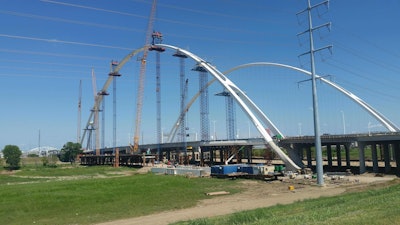 Construction occurs on Margaret McDermott Bridge in Dallas. The arches were completed in 2016. Photo: Estela Ornelas from City of Dallas website
Construction occurs on Margaret McDermott Bridge in Dallas. The arches were completed in 2016. Photo: Estela Ornelas from City of Dallas websiteFlaws in a pedestrian and bicycle bridge over the Trinity River in Dallas are leading to finger-pointing among state transportation and Dallas city officials, as well as the architect that designed the span, which is part of the Margaret McDermott Bridge system.
The bike and walking bridge was supposed to open last summer, but rods that are part of the cables that hold up the bridge have been cracking, the Dallas Observer newspaper reports. Officials with the city, the Texas Department of Transportation and architect Santiago Calatrava are at odds over who should pay to fix the problem, according to the Observer, with TxDOT saying the city shoulders the burden, and the city and Calatrava saying the onus is on TxDOT’s contractor. The parties have been arguing over the cable flaws for two years, the newspaper says.
The paper revealed that cable parts have failed in high winds, that tests were not conducted as originally required and “an adjustment rod was made of thinner material than called for in the original design.”
The paper traces the flaws to cost overruns in 2013 on the project and an effort by the city to reduce costs “by pressing TxDOT and its contractor to accept ‘value engineering’ (VE) … which amounts, basically, to cutting corners.” The paper reports that Calatrava had repeatedly urged the city to conduct the proper tests and offered to lend it money to do so.
“Was it the contractor’s fault for failing to carry out proper tests and for building with weaker materials?” the newspaper poses. “Was it TxDOT’s fault for failing to better oversee the contractor? Was it the city’s fault for pressing TxDOT and the contractor to accept the VE changes? Or was it Calatrava’s fault for designing a bad bridge?”
The paper reports that TxDOT sent out a letter January 30 saying it would not pay for the costs of future delays or repairs. In response to a request from the city to keep the contractor on the job after the completion date, TxDOT’s letter says that would cost about $1 million a month and would be the city’s responsibility, the Observer reports.











